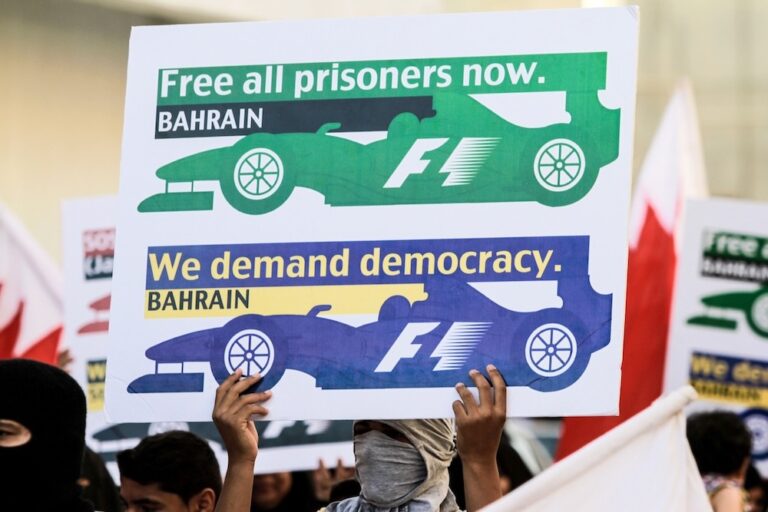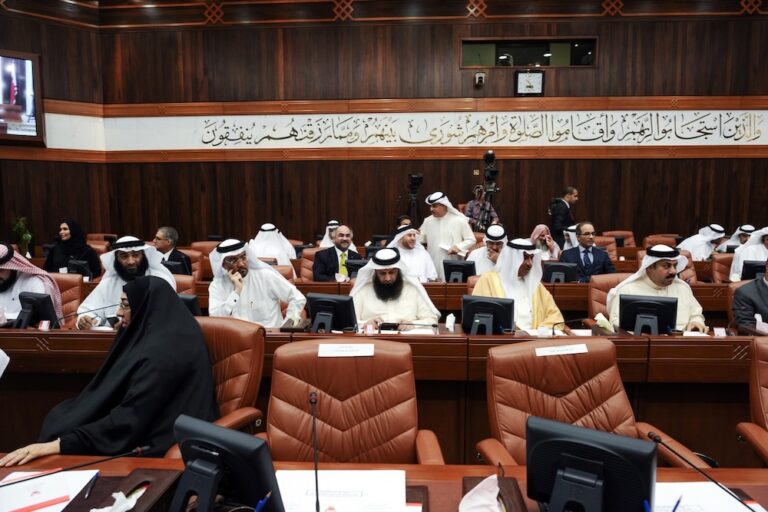(BCHR/IFEX) – BCHR is very concerned about the Bahraini government’s exploitation of sectarian religious tensions initiated by groups perceived as closely tied to the Royal Court and the government itself, with the aim of narrowing public freedoms. Nabeel Rajab, Vice President of the BCHR, expressed his concern in regards to the drift of some political […]
(BCHR/IFEX) – BCHR is very concerned about the Bahraini government’s exploitation of sectarian religious tensions initiated by groups perceived as closely tied to the Royal Court and the government itself, with the aim of narrowing public freedoms. Nabeel Rajab, Vice President of the BCHR, expressed his concern in regards to the drift of some political associations and members of the House of Representatives toward surrendering freedom to the government by calling for its intervention to silence mosque preachers and journalists and in regards to the closure of electronic forums on the pretext of the existence of a crisis between different sectors of the Bahraini Islamic community.
The cabinet exploited the fabricated crisis to issue a decision during its meeting on 22 June 2008, to form a committee headed by the Ministry of Interior that is to monitor adherence to the laws restricting information that allegedly promoted sectarianism and ensure that there are no violations by (. . .) newspapers or websites concerning “the values and national constants, especially with regard to the King and the Crown Prince, national unity and Arab identity and sectarianism.”
The Information Ministry has issued a decision concerning the closure of a number of websites on the grounds that they “violated the laws applicable in publishing and the press in regard to sectarian issues that might harm social stability in Bahrain.” Local press mentioned that the closed sites are: Awaal electronic newspaper ( http://www.awaal.net ); Bahrain bright sun ( http://www.ba7rainss.com/vb ); and Bahrain Forums ( http://www.bahrainforums.com ).
The Undersecretary of the Ministry of Information, Hamad Al Mana’ay, confirmed that: “we, in the Ministry of Information, to achieve the aspirations of the government, will seek coordination with the ministerial committee that was formed recently to deal with anything that might split the national front.” An official source said to the local press that “a daily monitoring of those sites will take place, and if it is proven that these sites violated the decision through the use of any techniques to circumvent the blocking and that they continue posting publications, the decision will be implemented and the sites will be closed again.”
It came to the attention of the BCHR that other websites have been closed as well, including three sites linked to the Islamic Action Society of the Shiite opposition: the site of the Society itself; a network – http://www.alresalia.com ; and forums of that network – http://forum.alresalia.com .
The closures of these websites has occurred in the wake of the closures of many other websites that are still closed, including the BCHR website, which is blocked inside Bahrain because of the publication and translation of the report issued by the former Government counsellor which revealed a secret government plan to undermine the opposition and marginalise the Shiite sect.
The current wave of the so-called sectarian crisis has been escalated by attacks carried out by Islamic Selfist MP Jassem Al-Saeedi against the Shiite cleric Sheikh Issa Qassem. The attack was in direct reaction to Sheikh Qassem’s sermon on 13 June, that touched on the current issue of prisoners in recent events, whom he said had been tortured in order to extract confessions, based on the findings of lawyers and medical commission set up by the court. He called for their release and asked the authorities to refrain from holding unfair trials or imposing sentences which could exacerbate the current political and security tensions. Sheikh Qassem also criticised the Interior Ministry’s use of excessive force which led to the injury of a young man, Majeed Alqattan, when a rubber bullet was fired at his head and almost killed him. He also criticised the restriction on mass peaceful protests, and called for a constitution to be agreed upon by consensus that would serve as a reference point to resolve political differences and prevent security problems.
The statements of MP Saeedi came as part of a sustained campaign conducted for several years through his almost daily statements, as well as Friday sermons, in which he attacks the beliefs of the Shiite sect and offends their Bahraini religious and political leaders, especially the government’s opponents. It is believed that the authorities have played a major role in Al-Saeedi’s successful campaign for election as a member of the House of Representatives, through the distribution of constituencies on the basis of sectarianism and tribalism. It is also believed that the Royal court has played a key role in supporting and financing his election campaign. Al-Saeedi does not belong to any political group and he is appointed as an Imam in Issa Town Mosque by the Sunni component of the Ministry of Justice.
The government banned the circulation of the report published by the former adviser to the Cabinet, Dr. Salah al-Bandar, in 2006, which implicated Al-Saeedi as one of the key figures in a secret network led by senior members of the ruling family, who have leading positions in the Royal Court. The secret network is reportedly working to penetrate the opposition and civil society institutions, to manipulate elections and to politically and economically marginalize the indigenous Shiite citizens.
“Akhbar-Alkhaleej” daily newspaper, which is close to the prime minister’s office, promotes Al-Saeedi’s statements and speeches, as does “Al-Watan” newspaper, which the former government adviser said in his report that it is one of the secret network tools and is funded by the Royal Court. Despite the fact that the controversial remarks made by Al-Saeedi were denounced in the media by different political and religious circles in various sects, the Prime Minister praised him publicly and the crown prince paid him a special visit. The Minister of Justice said that there was no complaint against Al-Saeedi issued by attendees of the mosque where he is the Imam. These incidents indicate that Al-Saeedi has the direct support of three key figures in the ruling family.
Accordingly, BCHR demands:
– the abolition of government regulations and practices that restrict freedom of the press, electronic journalism and preaching in mosques under the pretext of the need to avoid exacerbating sectarian tensions. Differences in the use of opinion mediums should be resolved by resorting to codes of ethics and laws that are consistent with international standards that prohibit discrimination and hate speeches, while ensuring the integrity and independence of the judiciary
– a strengthened role for the press and respect for the right of religious figures to make statements as elements in the protection of freedoms and promotion of human rights on the basis of equality and dignity, in order to move away from religious and sectarian intolerance
– respect for the rights of groups to peacefully mobilize and rally people to pressure the government to respect rights and freedoms and to put an end to daily violations
– the release of the details and documents contained in the report published by the former government adviser, and to investigate this in relation to the ongoing policies of repression, penetration, discrimination and incitement of sectarian tensions.


